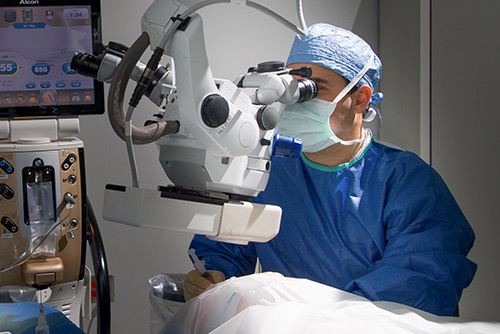The Cataract Surgeons in Shreveport, LA

Traditional cataract surgery has helped millions of people improve their vision. However, this approach also relies on a surgeon’s experience, coordination, and use of a scalpel for the procedure to be successful. LenSx, a form of laser cataract surgery that uses an advanced laser to make the necessary incision, removes those potential barriers to success and provides a less risky and more precise option for patients with cataracts.
What is LenSx Cataract Surgery?
LenSx laser cataract surgery is an eye surgery system that uses an image-guided femtosecond laser instead of a blade, as traditional cataract surgeries do. The LenSx laser shoots short pulses of light that negate the use of a blade. The bladeless system also uses real-time imaging of the eye to ensure a higher degree of precision to determine where the cuts should be made. This bladeless procedure also gives the surgeon the ability to insert the new lens with more efficiency and accuracy.
LenSx vs Traditional Cataract Surgery
Surgery Process
With traditional cataract surgery, the surgeon uses a sharp blade to create several small incisions in the front of your eye. Then a tool is inserted that emits ultrasound waves that break up the clouded lens to make it easier to remove. In some cases, the cataract can be removed whole. When this process is complete, the surgeon inserts an artificial lens.
While this process is overwhelmingly safe, it is not without risks. The tiny incisions into your eye are done manually, and the surgeon determines the cuts’ locations. Furthermore, extended use of the ultrasound device can also impact the eye.
Duration of Procedure
Due to the accuracy and less invasive nature, LenSx surgery typically requires only half the ultrasonic energy of traditional cataract energy. As the procedure is efficient, it typically takes no more than 10 minutes to complete. Complicated cases may take more time, sometimes up to 30 minutes.
Recovery Period
There will be a short recovery period post-procedure afterward. Our patients return home, through the help of a friend or driver, within a few hours of the surgery.
The Benefits of LenSx Cataract Surgery
When you undergo the LenSx procedure, you receive a variety of benefits over the traditional cataract surgery:
● LenSx is a quicker procedure than a traditional approach
● The more precise process for your specific eye needs
● Less invasive and lower complication risk
● No need for the manual of a blade
● The surgeon has increased control throughout the procedure
● More comfortable experience
● Shorter recovery period
Of course, the LenSx procedure’s overall benefit is improved eyesight that occurs almost immediately after the surgery has been completed. Progressive vision loss will immediately cease, and cataract issues are entirely resolved. You’ll no longer need glasses, content lenses, or other corrective eyewear.
The LensX laser also helps the surgeon manage a patient’s astigmatism. During traditional cataract surgery, this is not possible.
Issues are always possible. However, the LenSx system is designed to reduce as many complications as possible. Traditional cataract surgery is safe, yet the LenSx procedure is even safer with multiple safeguards taken to ensure your specific eye’s best outcome.
Are You a Good Candidate for LenSx?
Not everyone is a candidate for LenSx surgery. Those with complicated vision issues may not be eligible. During your consultation with your eye surgeon, we will assess whether or not you are a good candidate for LenSX and will recommend another approach if otherwise.
If you have been diagnosed with cataracts and are struggling with symptoms of cataracts, request an appointment with The Cataract Surgeons.
How to Prepare for Your LenSx Procedure
It should also be noted that LenSx is considered a premium procedure by most insurance carriers. This means you can expect to pay out-of-pocket expenses to have the surgery performed. However, your insurance may cover traditional cataract surgery. For a specific answer on your policy, it’s best to reach out to your insurance carrier.
Before your surgery date, you should arrange for post-procedure transportation from a friend, family member, or neighbor. While your vision will improve immediately, it’s essential to take precautions still to ensure you can arrive home safely to rest.
Otherwise, there is typically no need for involved preparations for LenSx surgery. Your surgeon, though, may provide you with specific instructions based on your unique circumstances. If you are given these instructions, it’s essential to follow them to ensure there are no complications during the recovery period.
What to Expect After LenSx Cataract Surgery
You should expect your vision to be improved immediately after a LenSx procedure. Still, it’s best to take at least 24 hours to rest and recover. This means refraining from activities that may strain your eyes and avoiding touching your eyes. Typically, you’ll have a post-surgery checkup within a few days of your surgery.
It’s essential to allow your eyes to heal after cataract surgery. While LenSx is noninvasive, your eyes have still undergone a significant event. You can expect to have some issues with coordination in the first few days after surgery, and you should stay away from environments that can lead to bacteria, dust, or other contaminants coming in contact with your eyes.
You will also receive eye drops to use while you recover. Make sure to follow all instructions from your surgeon, as they may have additional restrictions or advice for you to follow.
Schedule a Consultation with The Cataract Surgeons in Shreveport, LA
The Cataract Surgeons, a division of the WK Eye Institute in Shreveport, Louisiana, are here to help with eye-related issues. Using state-of-the-art tools and equipment, our surgeons and specialists offer potential ways of improving your vision with little to no side effects through our modern procedures. Meet our experienced surgeons to learn more.
Make an appointment with us today to see how we can help. We’ve provided our services and treatments to patients who live in the Shreveport area and those visiting from across the nation.
LenSx® FAQ
Learn about LenSx – Laser Cataract Surgery treatment options available at WK Eye Institute. Shreveport’s leading LASIK and cataract surgery providers. Offering the latest in LASIK vision correction and cataract surgery technology, Willis-Knighton Eye Institute are the Shreveport’s leading eye care professionals. Call 318-413-6855



